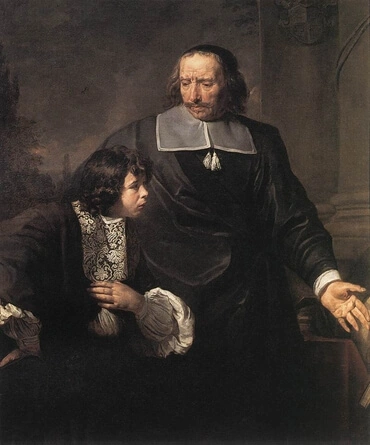Arcana Coelestia # 5528
5528. Verses 35-38 And so it was, as they were emptying their sacks, that behold, each man's bundle of silver was in his sack; and they saw their bundles of silver, they and their father, and they were afraid. And Jacob their father said to them, You have bereaved me [of my children]; Joseph is not, and Simeon is not, and you take Benjamin. All these things will be upon me. And Reuben said to his father - he said, Make my two sons die if I do not bring him back to you; give him into my hand, and I will bring him back to you. And he said, My son shall not go down with you, for his brother is dead, and he, he alone, is left. And should harm happen to him on the road on which you go, you will cause my grey hair to go down in sorrow to the grave.
'And so it was, as they were emptying their sacks' means the use performed by truths in the natural. 'That behold, each man's bundle of silver' means truths in ordered groups freely given. 'Was in his sack' means in each one's receptacle. 'And they saw their bundles of silver means a discernment that this was so. 'They and their father' means by the truths and the good of truth in the natural. 'And they were afraid' means a holy influence. 'And Jacob their father said to them' means a perception that came to them from the good of truth. 'You have bereaved me [of my children]' means that thus no Church existed any longer. 'Joseph is not' means that the internal does not exist: 'And Simeon is not' means that faith in the will does not exist either. 'And you take Benjamin' means if the intermediary also is taken away. 'All these things will be upon me' means that, when this is so, that which constitutes the Church will have been destroyed. 'And Reuben said to his father' means matters of faith present in the understanding were discerned by the good of truth. 'He said, Make my two sons die' means that neither of the two kinds of faith will survive. 'If I do not bring him back to you' means if no joining of the intermediary takes place. 'Give him into my hand' means insofar as it was in its power. 'And I will bring him to you' means that it will be restored. 'And he said, My son shall not go down with you' means that it will not move down towards inferior things. 'For his brother is dead' means because the internal is not present. 'And he, he alone, is left' means that this one now exists in place of the internal. 'And should harm happen to him on the road on which you go' means that, when in the company of truths alone in the natural that have been separated from the internal, it will perish. 'You will cause my grey hair to go down' means that this will accordingly be the final phase of the Church. 'In sorrow to the grave' means without hope of a restoration to life.
Man (male)

The relationship between men and women is deep and nuanced, and one entire book of the Writings -- Conjugial Love -- is devoted to the subject. So we can hardly offer a full explanation here. In a very general sense, though, the Writings say that men are creatures of intellect, driven by the love of growing wise; women, meanwhile are creations of affection, driven by the love of wisdom and the good that wisdom can do. They are formed this way to reflect the Lord's Divine Love and Divine Wisdom, and so that they can form marriages that reflect the unity of Divine Love and Divine Wisdom. Marking differences between men and women can be a touchy thing, but realistically it's easy to see that men tend to love acquiring knowledge whether it has any practical application or not. Many of them can spout out sports statistics or hold court on the workings of the internal combustion engine, even though it is knowledge they are not likely to ever use. They find such knowledge interesting for its own sake. It follows, then, that when the Bible speaks of men, the men represent facts, ideas, knowledge, truth, intellect and wisdom -- or in the negative sense falsity, twisted logic, and reasoning that is devoid of concern for others.






